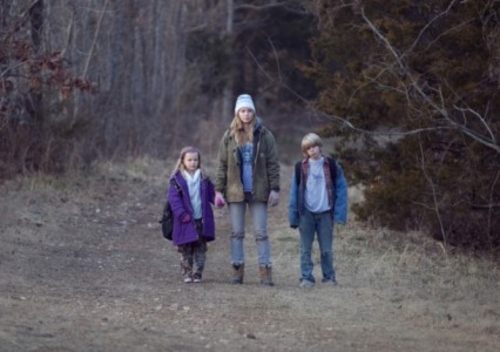
Winter’s Bone, the film adaptation of Daniel Woodrell’s novel of the same name, is an engaging, resonating film that won one of the Grand Jury Prizes at the Sundance Film Festival last year, and emerges as one of 2010’s finest films.
Ree Dolly is a young woman who attends high school, cooks and cares for her younger siblings and her vegetative mother, and yearns to know the whereabouts of her missing father. Her father is involved with the shadier crowd of the quiet town in the Ozarks, cooking crystal meth for the local users. I can’t explain too much of the story without giving it away, but it’s a gripping story that chills me to the…winter’s bone (hehe yes, yes, I know).
Basically, she goes looking for her missing father, and uncovers some of the small town’s more unpleasant secrets and inhabitants. She discovers that her father owed certain members of the town a substantial sum of money and he has put Ree’s house up as the bail bond, leaving them with days before they are evicted from their home. They have no one to call upon and no one to turn to in the frozen wilderness.The one police officer that does appear earlier in the film seems to do more harm than good. One of the most intriguing characters in the film is Teardrop, Ree’s uncle, who is played by John Hawkes. He dominates every scene he’s in, and it’s almost as if he leaves trails of frost in his wake.
Ree’s introspective journey is both realized and alienated at the same time; she’s traveling through a world that she knows so well, and yet she knows nothing about the situation she is tumbling into, much like Alice descending into the rabbit hole…but this is no nightmare that she can merely wake up from. The paradoxes of the film make for an eerie mystery full of plot twists and unpredictable turns. Ree endures another introspective journey as well, which involves taking care of her family. She becomes a surrogate mother almost, walking her brother and sister to school every day and feeding them every night. She takes on the role of both the mother and father in her family. In one particularly memorable scene, she converses with an army representative with the hopes of enlisting in order to support her family.
The ending of the film is particularly jolting and memorable, and I always appreciate the director ends a film properly. I’m not going to edit my top three films for 2010, but I will say that Agora and Winter’s Bone are both worthy of equal applause, as different as they may be.
